Effective Teaching
Course Module
Overview
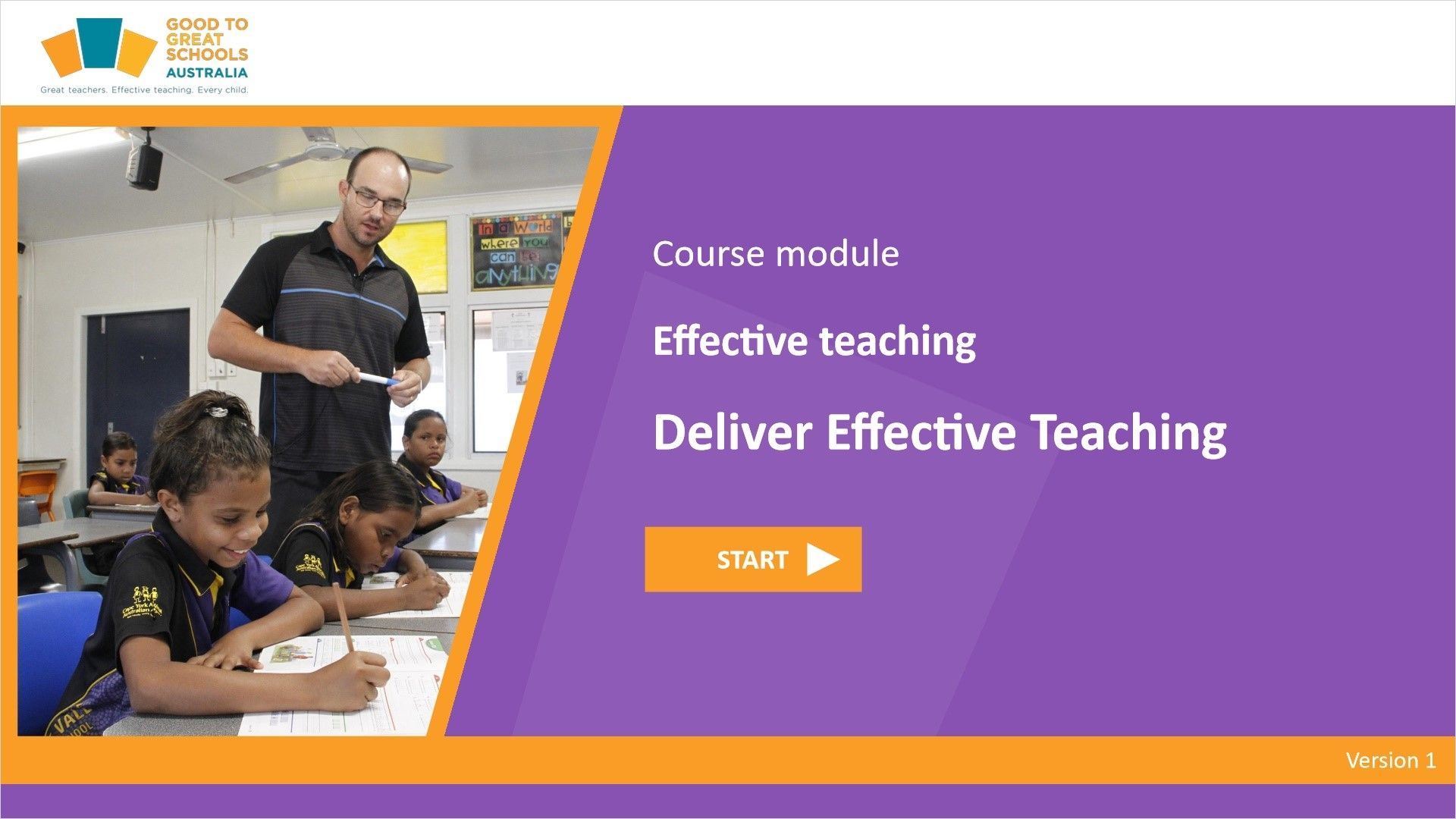
Deliver Effective Teaching
Deliver Effective Teaching is a professional learning module for teachers and teaching assistants that is aligned to AITSL national standards. Participants will understand the components of effective teaching resources. They can implement effective teaching techniques and practices in programs and resources, apply student engagement strategies and build relationships with parents to support students’ school readiness.
Learning Intents
- Understand components of effective teaching resources (such as the Teacher’s Guide) that align with core programs (3.1.04).
- Understand how to group students and maximise instructional time to manage classroom activities (3.4.02).
- Demonstrate effective use of instructional time by managing classroom (3.4.02).
- Apply classroom practices across all activities by setting clear behavioural expectations and facilitating routines, orderly transitions, and bell to bell teaching (3.4.02).
- Plan instructional day around appropriate instructional programs (3.1.10).
- Understand basic effective teaching techniques and practices in academics and behaviour (3.2.01).
- Understand range of verbal and non-verbal communication strategies that support student engagement in small and large group instruction (3.1.05).
- Demonstrate a range of verbal and non-verbal communication strategies to support student engagement in small and large group instruction (3.1.05).
- Plan improvement based on feedback to support student understanding, participation, engagement and achievement during small and whole group instruction (3.1.12).
- Implement all parts of direct and explicit instruction lessons (3.2.07).
- Implement direct and explicit instruction lessons with fidelity (3.2.08).
- Implement effective teaching techniques to develop problem solving skills in students (3.1.10).
- Understand basic direct instruction techniques and why they are used (3.1.03).
- Understand basic explicit instruction techniques and why they are used (3.1.03).
- Demonstrate ability to teach lessons using direct and explicit instruction teaching techniques (3.2.01).
- Understand purpose of providing timely and appropriate feedback to students about their learning and behaviour (3.6.02).
- Demonstrate remedies and re-testing as indicated in direct instruction following mastery tests and/or student checkouts and use correction procedure when students make errors (3.6.01).
- Demonstrate appropriate corrective feedback and effective teaching procedures for diagnosis and remediation of academic and behavioural errors (corrective actions when correcting errors) (3.6.02).
- Communicate corrective feedback to students during instruction and independent learning (3.6.02).
- Demonstrate direct and explicit instruction concepts in developing independent work that aligns to program being taught (3.1.04).
- Plan group instruction based on mastery data and program guidelines (3.2.08).
- Understand how to use mastery test data to assess student learning (3.6.01).
- Demonstrate remedies and re-testing as indicated in direct instruction following mastery tests and/or student checkouts and use correction procedure when students make errors (3.6.01).
- Plan instructional time to implement mastery tests as indicated in the program (3.6.06).
- Implement in-program and out of program assessments to evaluate student mastery levels (3.6.06).
- Review mastery test data to determine individual and group mastery (3.6.06).
- Communicate to colleagues and classroom visitors basic direct and explicit instruction techniques and uses (3.1.03).
- Communicate with school leaders, colleagues and parents appropriate use of direct and explicit instruction techniques (3.2.01).
- Communicate any concerns with student mastery by referring to mastery test data (3.6.01).
- Understand how parents can apply practices in the home that maximise their children’s learning opportunities (3.8.01).
- Apply family engagement practices in the community with parents to build relationship between parent and school (3.8.01).
- Demonstrate student learning and positive behaviour to parents through positive postcards, work samples and technology (3.8.01).
- Communicate student progress and home routines for parents to use to improve children’s learning readiness (3.8.01).
- Demonstrate awareness of local Aboriginal and Torres Strait Islander histories, cultures and languages in lessons and discussions with community members (3.8.02).
- Communicate clearly to convey warmth, honesty, and interest in student’s development (3.8.04).
Prerequisite
- Learn Effective Teaching Essentials.
Duration
- 12 Lessons
Assessment
Assessment has one stage:
- Test: Knowledge and skills taught in the lessons.
Certification
Participants are eligible for certification based on attendance and completion of assessment requirements for each module.
- Certificate of Attendance: Complete online training and knowledge and skills tests.
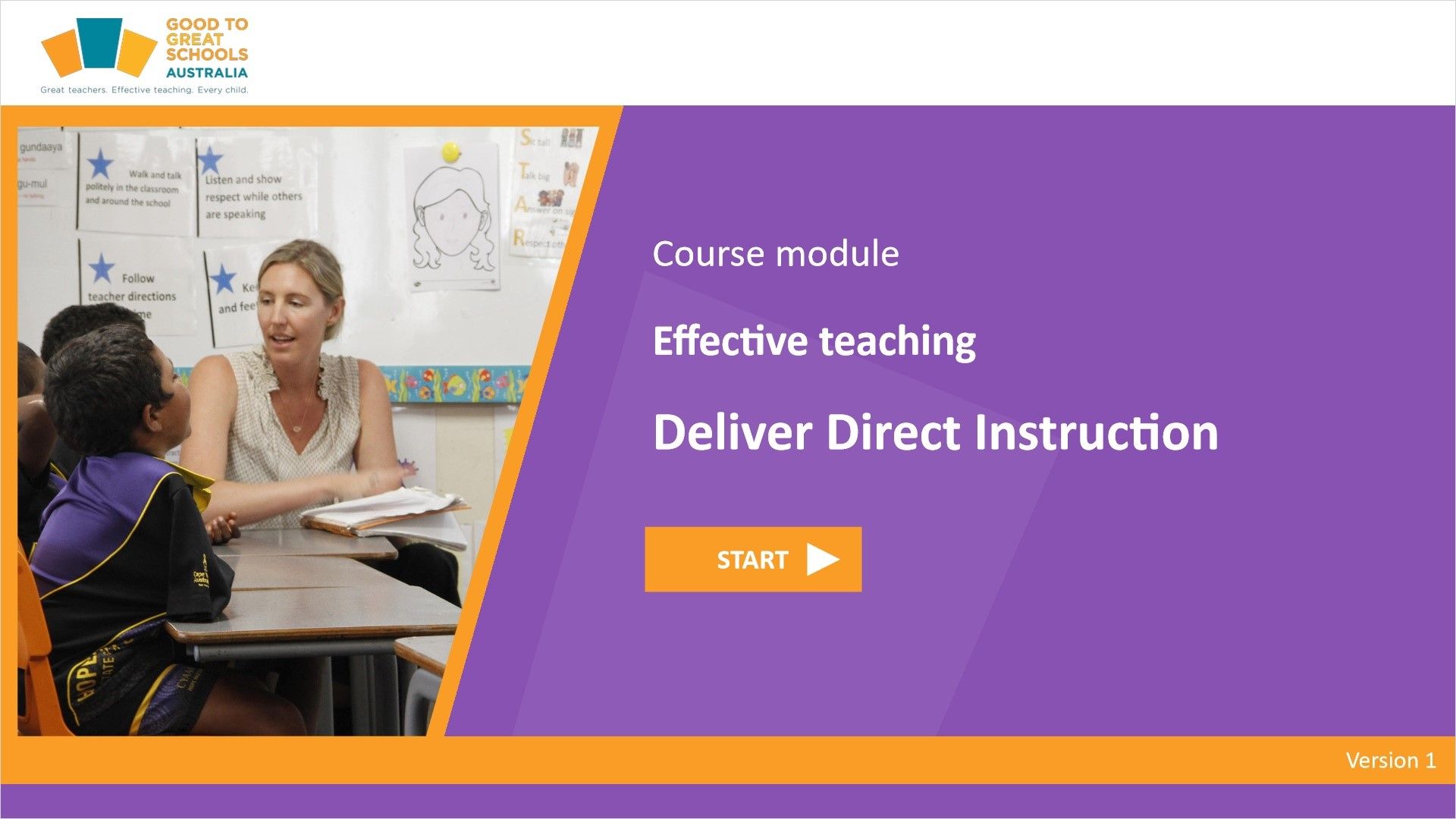
Deliver Direct Instruction
Teaching Direct Instruction is a professional learning module for teachers and teaching assistants that is aligned to AITSL national standards. Participants will learn how to prepare for teaching by understanding how to set the group up for success and using the Teacher Guide and Teacher Presentation Book. They will also understand student engagement strategies and the importance of building relationships with parents.
Learning Intents
- Understand importance of placement test in placing students in programs and levels (3.2.02).
- Understand how to group students and maximise instructional time to manage classroom activities (3.4.02).
- Understand the direct instruction content and the rationale behind program sequencing (3.1.02).
- Implement all parts of direct and explicit instruction lessons (3.2.07).
- Demonstrate techniques that engage students and deliver lesson components to fidelity (3.1.02).
- Understand basic direct instruction techniques and why they are used (3.1.03).
- Understand components of effective teaching resources (such as the Teacher Guide) that align with core programs (3.1.04).
- Understand basic effective teaching techniques and practices in academics and behaviour (3.2.01).
- Demonstrate ability to teach lessons using direct and explicit instruction teaching techniques (3.2.01).
- Plan instructional day around appropriate instructional programs (3.1.10).
- Plan lesson presentation using direct and explicit instruction teaching techniques (3.2.07)
- Implement direct and explicit instruction lessons with fidelity (3.2.08).
- Understand range of verbal and non-verbal communication strategies that support student engagement in small and large group instruction (3.1.05).
- Demonstrate a range of verbal and non-verbal communication strategies to support student engagement in small and large group instruction (3.1.05).
- Plan improvement based on feedback to support student understanding, participation, engagement and achievement during small and whole group instruction (3.1.12).
- Apply classroom practices across all activities by setting clear behavioural expectations and facilitating routines, orderly transitions, and bell to bell teaching (3.4.02).
- Demonstrate direct and explicit instruction concepts in developing independent work that aligns to program being taught (3.1.04).
- Demonstrate remedies and re-testing as indicated in direct instruction following mastery tests and/or student checkouts and use correction procedure when students make errors (3.6.01).
- Understand purpose of providing timely and appropriate feedback to students about their learning and behaviour (3.6.02).
- Demonstrate appropriate corrective feedback and effective teaching procedures for diagnosis and remediation of academic and behavioural errors (corrective actions when correcting errors) (3.6.02).
- Communicate corrective feedback to students during instruction and independent learning (3.6.02).
- Understand how to extract student mastery data from curriculum, assessment, and reporting (3.2.03).
- Plan group instruction based on mastery data and program guidelines (3.2.08).
- Understand how to use mastery test data to assess student learning (3.6.01).
- Demonstrate remedies and re-testing as indicated in direct instruction following mastery tests and/or student checkouts and use correction procedure when students make errors (3.6.01).
- Plan instructional time to implement mastery tests as indicated in the program (3.6.06).
- Implement in-program and out of program assessments to evaluate student mastery levels (3.6.06).
- Review mastery test data to determine individual and group mastery (3.6.06).
- Evaluate next steps for groups, based on mastery test data and in collaboration with the instruction coach (3.6.06).
- Communicate rationale behind program sequencing to school leaders, colleagues and parents (3.1.02).
- Communicate to colleagues and classroom visitors basic direct and explicit instruction techniques and uses (3.1.03).
- Communicate with school leaders, colleagues and parents appropriate use of direct and explicit instruction techniques (3.2.01).
- Communicate any concerns with student mastery by referring to mastery test data (3.6.01).
- Understand how parents can apply practices in the home that maximise their children’s learning opportunities (3.8.01).
- Apply family engagement practices in the community with parents to build relationship between parent and school (3.8.01).
- Demonstrate student learning and positive behaviour to parents through positive postcards, work samples and technology (3.8.01).
- Communicate student progress and home routines for parents to use to improve children’s learning readiness (3.8.01).
- Demonstrate awareness of local Aboriginal and Torres Strait Islander histories, cultures and languages in lessons and discussions with community members (3.8.02).
- Understand how to have honest conversations with parents about student’s needs, behaviour, and their progress (3.8.04).
- Apply honest conversation practices to remind, resolve and reinspire their support (3.8.04).
- Communicate clearly to convey warmth, honesty, and interest in student’s development (3.8.04).
Prerequisite
- Learn Effective Teaching Essentials.
Duration
- 12 lessons.
Assessment
Assessment has one stage:
- Test: Knowledge and skills taught in the lessons.
Certification
Participants are eligible for certification based on attendance and completion of assessment requirements for each module.
- Certificate of Attendance: Complete online training and knowledge and skills tests.
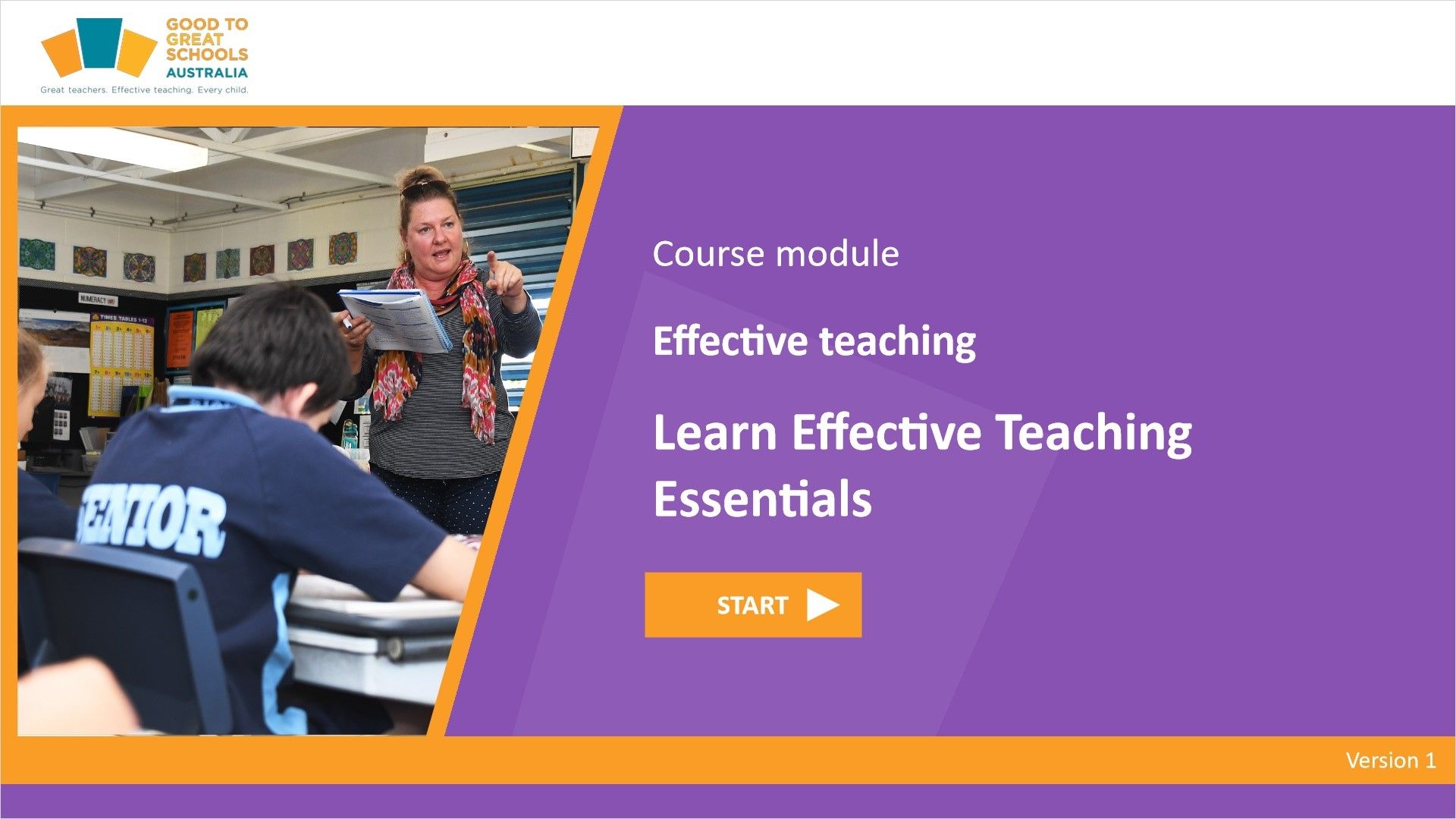
Learn Effective Teaching Essentials
Learn Effective Teaching Essentials is a professional learning module for principals, instruction coaches, teachers and teaching assistants that is aligned to AITSL national standards. Participants understand how effective teaching leads to increased learning and overall school improvement. They can implement effective teaching techniques and practices in programs and resources, apply student engagement strategies, and build relationships with parents to support students’ school readiness.
Learning Intents
- Understand the basic direct instruction techniques and why they are used (3.1.03).
- Understand the basic explicit instruction techniques and why they are used (3.1.03).
- Understand basic effective teaching techniques and practices (3.2.01).
- Demonstrate mastery of basic direct and explicit instruction techniques through weekly program practice sessions and then in classroom delivery (3.1.03).
- Communicate to colleagues and classroom visitors basic direct and explicit instruction techniques and why they are used (3.1.03).
- Demonstrate ability to teach lessons using direct and explicit instruction teaching techniques (3.2.01).
- Communicate with school leaders, colleagues, and parents the appropriate use of direct and explicit instruction techniques (3.2.01).
- Understand how direct and explicit instruction programs develop strong literacy and numeracy skills for all students (3.2.05).
- Demonstrate direct and explicit instruction techniques to build strong literacy and numeracy for all students (3.2.05).
- Communicate to parents how direct and explicit instruction programs develop literacy and numeracy and the importance of those skills (3.2.05).
- Understand how effective teaching is targeted to students to meet the physical, social, and intellectual development and characteristics of students (3.3.01).
- Understand principles of effective teaching and how it is targeted to students to meet the physical, social, and intellectual development and characteristics of students (3.3.01).
- Communicate to leaders and colleagues information about effective teaching practices and how it is targeted to individual student needs (3.3.01).
- Understand through basic research how students learn and how effective teaching responds to this (3.3.02).
- Demonstrate how research on students learning is incorporated into effective teaching techniques and practices (3.3.02).
- Communicate to school leaders and colleagues how basic research on effective teaching informs teaching practice (3.3.02).
- Covered by 3.3.01 (Incorporate awareness of the differences between students in terms of diverse linguistic, cultural, religious, and socioeconomic backgrounds and how effective teaching practices can be applied across student diversity and be effective for all students) (3.3.03).
- Covered by 3.3.01 (Incorporate understanding of the impact of culture, cultural identity, and linguistic background on the education of Aboriginal and Torres Strait Islander students) (3.3.04).
- Covered by 3.3.01 (Incorporate differentiate teaching that meets the needs of students across the full range of abilities) (3.3.05).
Prerequisite
- None.
Duration
- 12 Lessons.
Assessment
Assessment has one stage:
- Test: Knowledge and skills taught in the lessons.
Certification
Participants are eligible for certification based on attendance and completion of assessment requirements for each module.
- Certificate of Attendance: Complete online training and knowledge and skills tests.
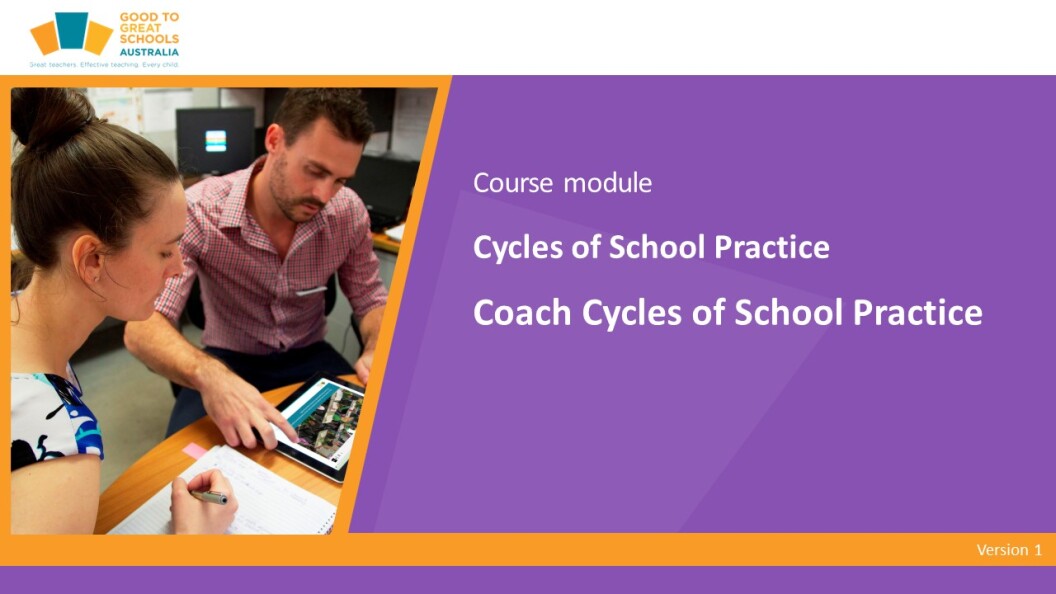
Coach Cycles of School Practice
Coach Instructional Improvement is a professional learning module for instruction coaches. Participants understand their role in leading the school and how to strengthen their practice to achieve instructional improvement in their school. They can embed cycles of practice in their school. They can lead data reviews to collect and analyse data, use the data to problem-solve issues and set actions, and coach teachers to implement those actions so that their teaching is more effective and student results are lifting across the school.
Learning Intents
- Understand the need for change and for a high expectations culture and no excuses approach (2.2.01).
- Apply a high expectations culture and a no excuses approach (2.2.01).
- Communicate to leaders and teaching faculty the need for change (2.2.01).
- Understand how shared accountability leads to achievement of high standards (2.2.03).
- Apply cycles of review, responsibility, and shared accountability to achieve high standards (2.2.03).
- Communicate the importance of shared accountability in achieving high standards (2.2.03).
- Understand the need for a culture of continuous improvement (2.3.04).
- Apply principles of continuous improvement across the school (2.3.04).
- Communicate a culture of continuous improvement as a key characteristic of the school (2.3.04).
- Evaluate ways of improving participation in school improvement efforts (2.3.07).
- Understand how effective teaching affects instructional improvement (2.1.01).
- Plan student groups based on placement testing (2.1.06).
- Understand how to use placement test data to place students in their correct levels and programs (2.2.02).
- Apply key practices that support effective teaching and positive behaviour interventions and strategies (2.1.01).
- Apply cycles of practice that support effective teaching implementation (2.1.02).
- Evaluate mastery of effective teaching and behaviour techniques amongst teachers and teaching assistants and provide suggestions for improvement (2.1.05).
- Plan training and coaching as per the professional development plan (2.1.05).
- Implement coaching and feedback cycles of practice (2.1.05).
- Plan regular professional conversations (2.1.07).
- Review participation of school leaders and teaching faculty in professional conversations. (2.1.07).
- Evaluate participation data and encourage the entire school team to participate in collegial activities (2.1.07).
- Review groups, resource setup and schedules throughout the year (2.1.06).
- Evaluate practices around student placement testing, grouping, resource setup and schedules and determine where improvements can be made (2.1.06).
- Apply oversight to delivery of effective teaching, including placement and movement of students in programs (2.2.02).
- Communicate with leadership and teaching faculty how decisions are made regarding student placement and movement to maximise mastery (2.2.02).
- Apply methods for collecting and interpreting evidence to identify and share successful strategies (2.3.02).
- Communicate to leadership and teaching faculty examples of excellent teaching and learning (2.3.02).
- Implement cycles of practice that lead to personal improvement of teaching faculty (2.3.06).
- Motivate school team to seek opportunities for professional growth (2.3.09).
- Model ongoing development through personal participation in professional growth opportunities (2.3.09).
- Coach school team in development of a personal learning plan to progress their development to mastery (2.3.09).
- Coach teaching faculty in identifying coaching and training needs (2.2.11).
- Evaluate improvement efforts based on student mastery data (2.02.6).
- Apply effective collaborative skills in working with agencies to support students and families (2.4.03).
- Communicate the importance of collaborative efforts in ensuring the health, wellbeing and safety of students.
- Plan opportunities for collaborative practices in the school (2.3.07).
- Implement practices that allow everyone in the school team to contribute to improvement (2.3.07).
- Review participation of individuals in contributing to school improvement (2.3.07).
- Embed practices to review effectiveness of processes to improve performance (2.02.14).
- Understand effective practices for engaging the community (2.1.04).
- Understand the importance of parent engagement in improving student outcomes (2.4.01).
- Communicate the importance of parent engagement to teaching faculty as a key aspect of improving student outcomes (2.4.01).
- Plan cycles of practice to cultivate a collaborative and trusting relationship with community (2.4.07).
- Implement practices that cultivate trust between school and community (2.4.07).
- Plan specific strategies for hard-to-reach parents (2.04.08).
Prerequisite
- Learn Effective Teaching Essentials.
Duration
- 12 Lessons.
Assessment
Assessment has three stages:
- Test: Knowledge and skills taught in the lessons.
- Appraisal: Practical application in practicing knowledge and skills learned in the lessons.
- Mastery evaluation: Delivery with students of the knowledge and skills learned in the lessons.
Certification
Participants are eligible for certification based on attendance and completion of assessment requirements for each module.
- Certificate of Attendance: Complete online training and knowledge and skills tests.
- Certificate of Participation: Pass knowledge and skills video Appraisal.
- Certificate of Achievement: Pass knowledge and skills video Mastery evaluation.
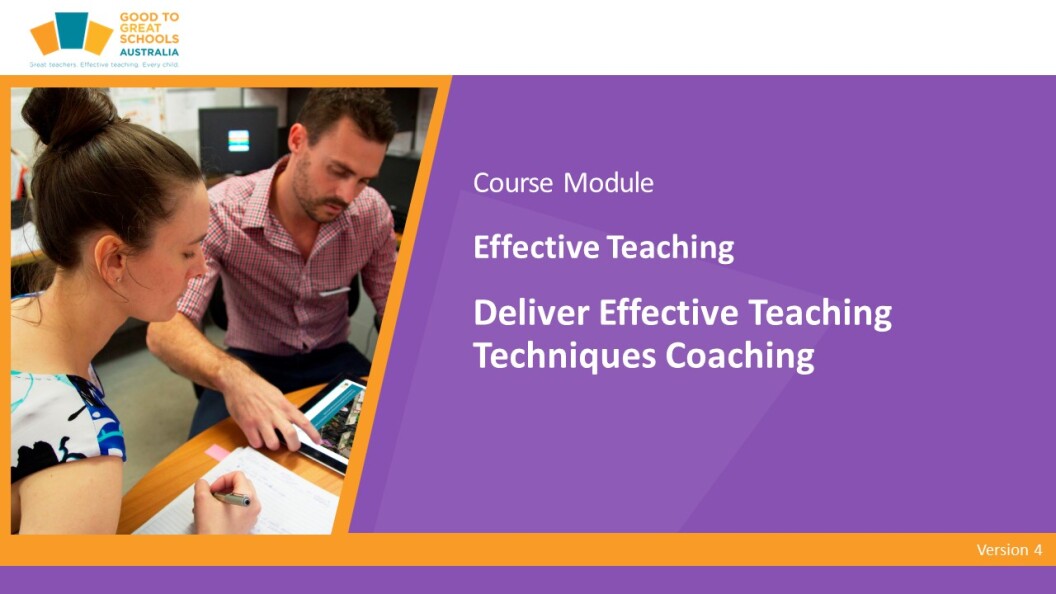
Deliver Effective Teaching Techniques Coaching
Coach Effective Teaching Techniques is a professional learning module for instruction coaches. Participants understand the critical role of coaching to build a positive high-expectations school that cohesively delivers effective teaching. They can conduct observations and use the data in communicating to teachers and teaching assistants about their practice. They learn how to plan and deliver coaching sessions to support the school team in delivering effective teaching so that their teaching is more effective and student results are lifting across the school.
Learning Intents
- Understand how effective teaching affects instructional improvement (2.1.01).
- Apply key practices that support effective teaching and positive behaviour interventions and strategies (2.1.01).
- Communicate a vision of instructional and behavioural improvement centred on effective teaching (2.1.01).
- Understand what constitutes effective teaching and positive behaviour interventions and supports (2.1.02).
- Apply cycles of practice that support effective teaching implementation (2.1.02).
- Communicate to leaders and teaching team what constitutes effective teaching and cycles of practice that support implementation efforts (2.1.02).
- Review observation and student mastery data to determine need for modelling, coaching and feedback (2.2.06).
- Evaluate need for practice based on observation data and communicate to teachers. (2.3.05).
- Review observation and student mastery data to determine need for reflective practices, structured feedback and peer review (2.3.06).
- Understand how to implement practices that promote a culture of professional learning (2.1.03).
- Communicate importance of professional learning through practices that recognise efforts of leaders and teaching team to improve (2.1.03).
- Plan training and coaching sessions to ensure all the school team is supported to deliver effective teaching (2.2.05).
- Plan effective practices for supporting fidelity of implementation of effective teaching (2.2.06).
- Implement cycles of practice to support fidelity of implementation, including classroom observations, demonstrations, modelling, coaching and feedback on effective teaching (2.2.06).
- Communicate recommendations of external experts to school team to build knowledge, skills and practice (2.3.01).
- Understand how professional peer networks can support shared practice and use of resources (2.3.03).
- Apply principles of peer collegiality through contributing to professional peer networks (2.3.03).
- Communicate with other schools and education networks via professional peer networks (2.3.03).
- Plan a schedule for program practice sessions (2.3.05).
- Implement an effective agenda for practice sessions (2.3.05).
- Review practice session attendance and follow up to increase participation (2.3.05).
- Plan opportunities for reflective practices, structured feedback, peer review and teaching standards (2.3.06).
- Plan professional conversations to clarify how school vision and values link to operational tasks. (2.2.07).
- Understand gaps between personal knowledge, skills and practice and requirements of own role (2.3.01).
- Apply recommendations of external experts to prioritise learning gaps and increase needed skills (2.3.01).
- Implement cycles of practice that lead to personal improvement of teaching team (2.3.06).
- Evaluate personal improvement of teaching team based on growth in teaching standards (2.3.06).
- Evaluate improvement efforts based on student mastery data (2.2.06).
Prerequisite
- Learn Effective Teaching Essentials
- Build Positive High-Expectation School Communities.
Duration
- 12 Lessons.
Assessment
Assessment has three stages:
- Test: Knowledge and skills taught in the lessons
- Appraisal: Practical application in practicing knowledge and skills learned in the lessons
- Mastery evaluation: Delivery with students of the knowledge and skills learned in the lessons.
Certification
Participants are eligible for certification based on attendance and completion of assessment requirements for each module.
- Certificate of Attendance: Complete online training and knowledge and skills tests.
- Certificate of Participation: Pass knowledge and skills video Appraisal.
- Certificate of Achievement: Pass knowledge and skills video Mastery evaluation.
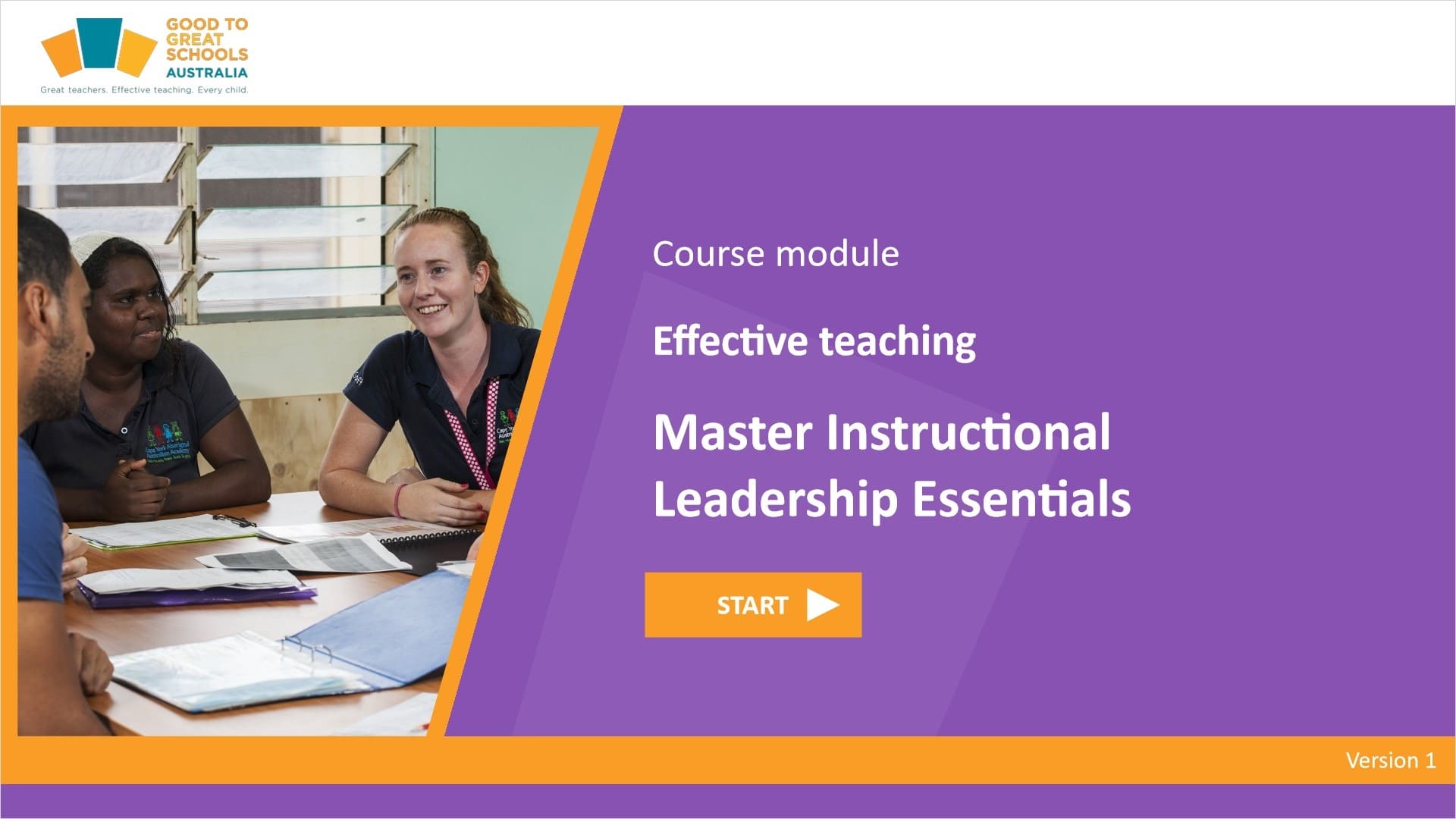
Master Instructional Leadership Essentials
Instructional Leadership Essentials is a professional learning module for principals. It introduces the concept of improvement cycles and provides practical information on setting up the school to deliver effective teaching. Participants understand how marginal improvement is achieved through continuous improvement and learn to apply resources, management procedures and processes that support school improvement goals.
Learning Intents
- Communicate school vision of effective teaching, positive behaviour supports and professional learning (1.1.01).
- Apply research-based practices to grow a professional learning community centred on effective teaching and high expectations for all (1.1.03).
- Communicate importance of school improvement effort based on evidence and targeted toward student learning and behaviour (1.2.03).
- Implement school improvement efforts based on research on effective teaching and positive school culture (1.3.05).
- Communicate management procedures to staff so they take responsibility for efficient school management (1.5.01).
- Apply placement test results and program placement recommendations to ensure students are placed correctly (1.2.02).
- Apply professional learning plan so that teaching faculty get regular access to the right training when needed and specialist training that deepens their knowledge and skills in academics and behaviour (1.3.01).
- Apply resources, management procedures and processes that support school improvement goals (1.5.02).
- Plan school timetable to ensure allocated teaching and learning meets student needs (1.5.06).
- Evaluate access to instructional materials to ensure leaders and teaching faculty have the instructional materials they need in academics and behaviour (1.5.06).
- Communicate to school leaders and teaching faculty what constitutes effective teaching and role of coaching and feedback in building a school culture focused on student learning and positive behaviour (1.1.02).
- Apply data review routines to ensure the whole school routinely improves its instructional and behavioural repertoire (1.3.02).
- Communicate to the school team the importance of collaboration to increase student academic and behaviour outcomes (1.3.03).
- Communicate a clear vision of peer collegiality focused on effective teaching behaviour practices and techniques (1.5.03).
- Apply effective processes for using data to improve school performance in academics and behaviour (1.5.04).
- Apply structural elements that drive effective teaching and positive behaviour interventions across school (1.2.01).
- Communicate standards of consistent behaviours across school and community (1.2.04).
- Communicate to parents and community ways to support school and their children behaviourally and academically (1.1.04).
Prerequisite
- Learn Effective Teaching Essentials.
Duration
- 12 lessons.
Assessment
.Assessment has three stages:
- Test: Knowledge and skills taught in the lessons
- Appraisal: Practical application in practicing knowledge and skills learned in the lessons
- Mastery evaluation: Delivery with students of the knowledge and skills learned in the lessons.
Certification
Participants are eligible for certification based on attendance and completion of assessment requirements for each module.
- Certificate of Attendance: Complete online training and knowledge and skills tests.
- Certificate of Participation: Pass knowledge and skills video Appraisal.
- Certificate of Achievement: Pass knowledge and skills video Mastery evaluation.
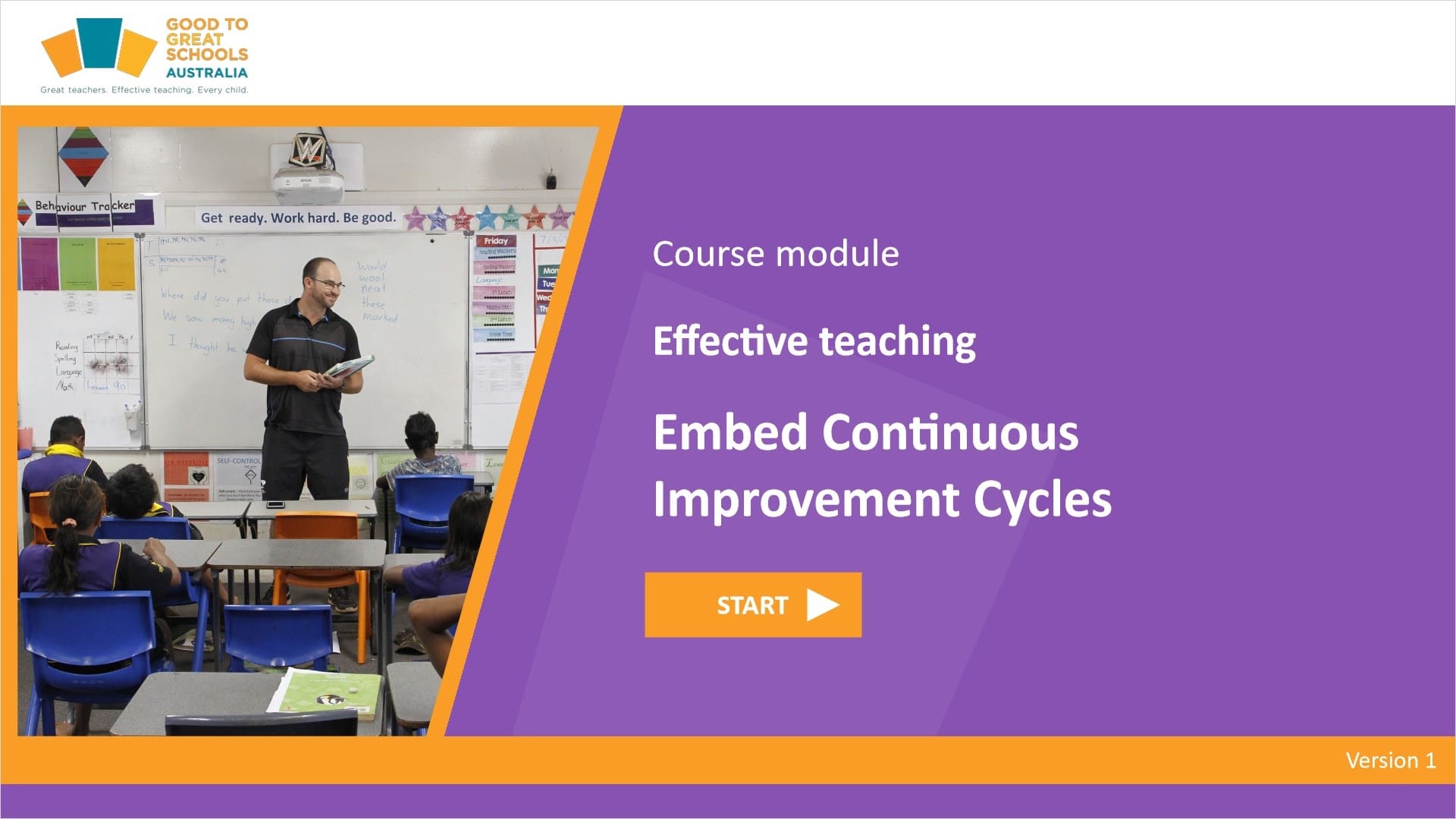
Embed Continuous Improvement Cycles
Continuous Improvement Cycles is a professional learning module for principals, instruction coaches, teachers and teaching assistants. Participants will understand how the 8 Cycles of School Practice guide school improvement efforts. They will learn to articulate a vision of high expectations and achievement for all students and use data to improve outcomes in academics and behaviour. Participants will also learn to develop routines around planning, participating in and documenting professional learning. Implementing cycles to broaden and deepen parent engagement in student learning and behaviour and articulating school progress and school improvement goals and the role of parents and community in school improvement efforts will also be a part of this module.
Learning Intents
- Develop practices that communicate high expectations and achievement for all (1.4.10).
- Implement school-wide academic and behaviour improvement actions into classroom approach (3.1.13).
- Articulate and document the effects of professional development on student mastery and behaviour goals (1.1.09).
- Develop a deeper knowledge and understanding of effective teaching through training focused on instructional improvement and high expectations positive school culture (1.3.09).
- Evaluate professional knowledge and practice and apply constructive feedback to improve practice (4.1.07).
- Monitor progress of the whole-school professional learning plan and effect of professional development on school improvement targets in academics and behaviour (1.1.09).
- Manage coaching and feedback cycles to provide the school team with regular feedback (1.1.10).
- Implement plan to enable observations and hours assessment of newly mastered techniques and practices being delivered to fidelity (3.5.06).
- Plan coaching and feedback with colleagues to improve effective teaching techniques (3.5.07).
- Implement plan to practice and share constructive feedback (3.5.07).
- Articulate outcomes based on student mastery and behaviour data and actions needed to optimise student learning (1.3.10).
- Model sharing data that shows how the school is closing achievement gaps of students (1.4.10).
- Model the use of technology to record, analyse and share information (2.2.10).
- Evaluate effect of improvement actions through changes in student data (4.1.06). Model peer collegiality focused on implementation of effective teaching and positive behaviour interventions and supports (1.1.11).
- Implement cycles of practice that increase professional collegiality, including professional conversations (2.1.07).
- Implement opportunities to expand professional learning opportunities through collaborative relationships (4.1.08).
- Develop collaboration with other schools and networks to guide, coach and mentor peers to promote effective teaching and positive behaviour interventions and supports (1.4.11).
- Model the understanding and respect for cultural and linguistic diversity (1.4.11).
- Develop leadership in others through encouraging parents and other community leaders to build consensus and take individual responsibility for implementing change (1.3.12).
- Develop a community partnership forum to ensure the school team and families are exploring ways to improve education opportunities for students (1.4.09).
- Evaluate ideas from community networks and forums to meet the needs of students and the school (4.3.08). Understand the role of community representatives in broadening effective teaching knowledge and practice (4.4.04).
- Plan practices that encourage families to build community consensus and individual responsibility for implementing change (2.3.08).
- Implement opportunities for families to become actively involved in school change efforts (2.3.08).
- Model effective ways to broaden and deepen parent engagement in student learning and behaviour (1.1.12).
- Coach school team in increasing parent engagement focused on school readiness (2.1.12).
- Understand how to utilise honest conversations to increase parental engagement (2.2.04).
- Plan how to positively engage parents in their children’s work to motivate and maximise children’s learning (3.8.05).
- Articulate what has worked in parent engagement and how that learning can be built upon to improve parent engagement practices (1.1.12).
- Articulate school progress and school improvement goals and the role of the parents and community in school improvement efforts (1.2.12).
- Develop routines for regular celebration of academic and behaviour achievement (1.4.12).
- Model high ethical standards, support codes of ethics and exercise sound judgement in all community contexts (2.4.09).
- Evaluate the effectiveness of actions to maintain appropriate conduct, exercise sound judgement and deal professionally with students (3.7.04).
- Plan a response that builds on a personal approach to incorporating local Aboriginal and Torres Strait Islander histories, cultures, and languages into personal practice (3.2.10).
Prerequisite
- Learn Effective Teaching Essentials.
Duration
- 12 Lessons.
Assessment
Assessment has three stages:
- Test: Knowledge and skills taught in the lessons
- Appraisal: Practical application in practicing knowledge and skills learned in the lessons
- Mastery evaluation: Delivery with students of the knowledge and skills learned in the lessons.
Certification
Participants are eligible for certification based on attendance and completion of assessment requirements for each module.
- Certificate of Attendance: Complete online training and knowledge and skills tests.
- Certificate of Participation: Pass knowledge and skills video Appraisal.
- Certificate of Achievement: Pass knowledge and skills video Mastery evaluation.
